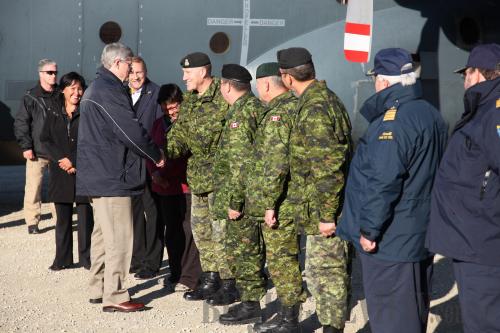|
 |
|
ARCTIC AMBITIONS: Canadian Prime Minister Stephen Harper greets officers after arriving in Nunavut to attend an Arctic sovereignty military exercise called Operation Nanook on August 25, 2010 (ZHANG DACHENG) |

As climate change hastens the disappearance of the Arctic ice cap, global players including sovereign states, international organizations and multinational corporations are beginning to take greater interest in the northernmost part of the planet.
The Arctic presents business opportunities for commercial shipping, oil and gas exploration, mineral exploitation as well as fishing and tourism. As a result of this potential, the Arctic's geopolitical significance has increased.
In this context, Arctic governance, which aims to promote the sustainable development of the Arctic, has been thrust into the global spotlight. The ongoing scramble for shipping routes and natural resources in the region has made it imperative to improve its governance.
Flawed arrangements
Arctic governance is not a new concept. Existing arrangements include global policy frameworks such as the UN Convention on the Law of the Sea (UNCLOS) and the UN Framework Convention on Climate Change (UNFCCC), as well as regional agreements on the establishment of the Arctic Council and the Barents Euro-Arctic Council. The International Maritime Organization (IMO) has also adopted navigation rules for the Arctic such as the Guidelines for Ships Operating in Arctic Ice-Covered Waters.
These arrangements, however, are riddled with flaws. For instance, the UNCLOS, which puts forward general principles on the law of the sea, does not address specific issues pertinent to the Arctic, such as scientific research, resource development, fishing and environmental protection. Worse still, some of the UNCLOS' provisions on the outer continental shelf beyond 200 nautical miles may add fuel to the rush for Arctic resources.
The UNFCCC also lacks provisions especially designed to protect the Arctic environment. The ecological environment in the Arctic, however, is so vulnerable that any damage would be virtually irreversible and stricter protection measures are an urgent necessity.
Moreover, the United States' absence from the UNCLOS, the Stockholm Convention on Persistent Organic Pollutants and the Kyoto Protocol of the UNFCCC has undermined the universality and authority of these documents. The soft laws enacted by the IMO and the Arctic Council, which are not legally binding, cannot be effectively enforced.
While focusing on scientific research, environmental protection and sustainable development, the eight-member Arctic Council gives short shrift to political and military issues. Regional arrangements are also unable to solve trans-regional environmental and climate issues or global issues concerning the Arctic, including navigation and energy.
In a nutshell, a politically valid and legally binding Arctic governance system has yet to be established. Also absent in the Arctic is a mechanism that can promote all-round regional development and help countries reach agreements on its resources and shipping routes.
A global topic
The Arctic states, of course, should have a greater say in Arctic governance. Other countries also have the right to take part in discussions in accordance with international conventions such as the Svalbard Treaty and the UNCLOS. A few Arctic states, however, tend to monopolize Arctic affairs and reject other countries' participation. In recent years, they have strengthened coordination in an attempt to shut the door on non-Arctic states' involvement.
For instance, Russia, Canada, the United States, Denmark and Norway, known as the "Arctic Five," have reaffirmed their pledge to address disputes over outer continental shelf demarcation peacefully in keeping with international law. These countries hope to find ways to resolve or partially resolve their disputes through cooperation. In April 2010, Norway and Russia reached an agreement on their shared borders in the Barents Sea and the Arctic Ocean, which underlined the importance of cooperation and observance of the international maritime law.
| 